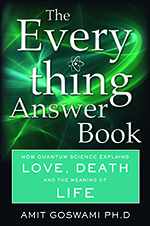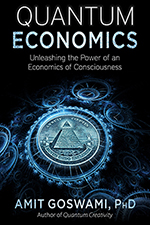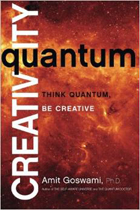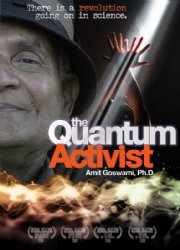The Importance of Intuition in Everyday Life
By Amit Goswami, Ph.D
The most harmful legacy of the current science based on scientific materialism is the systematic undermining that has taken place about the importance of intuition in our everyday lives.
In ancient times and cultures, intuition was recognized as “talking to God” or a summons from the Holy Spirit. Creative people of those old cultures knew that intuition was an invitation from the archetypes of value of the transcendent domain of reality and followed up the invitation with exploration of the archetype. This is how our civilization has progressed. The exploration of the archetypes has led to the great arts (the exploration of the archetype of beauty), the spiritual traditions (the exploration of the archetypes of wholeness, love, and goodness), and more recently, even science (an exploration of the archetype of truth).
Recently, prominent Fox News persona Bill O’Reilly was speaking to a TV journalist who was interviewing him about his new book Killing Jesus (or maybe about one of O’Reilly’s other books of the “killing” series). The journalist asked, “Where did your idea for the name of this series of books come from?” To this, O’Reilly said, “from the Holy Spirit.” This response then became the butt of a Steven Colbert joke whose show is where I picked up the story.
I am sure a Fox News audience would not have been amused. For most of them, O’Reilly is just reporting fact. But it is a joke for Colbert and his liberal audience because liberals today, under the aegis of scientific materialism, do not subscribe to concepts such as the Holy Spirit, let alone admit that an experience of the Holy Spirit is even possible. In this way, liberals undermine the importance of intuition.
But intuition is the doorway to creativity—both outer exploration and inner transformation. When intuition is undervalued, civilization itself stops progressing. Moreover, ordinary people lose their way to balancing the negative to achieve even temporary wholeness.
Let me explain. Modern science—neurophysiology—has established that our evolution has given us humans brain centers—let’s call them brain circuits—of negative emotions: anger, lust, jealousy, competitiveness, envy, etc. How do ordinary people handle such negative emotions? In American culture, it is not encouraged to express these emotions in public, so people try to suppress them giving them mind-body disease (chronic disease such as heart disease and cancer, read my book The Quantum Doctor). Additionally, they cope with the overall negativity of their life by indulging in the brain circuits of pleasure—fast food, casual sex, narcissism.
Many authors argue that mind-body chronic disease is much more prevalent today than ever before. Undoubtedly, there is more stress in modern life, but I think there is one more important factor. We don’t hear the voice of our intuition and follow through. We have to go to a doctor—scientific materialists most—to get directions for healing. To their credit, these doctors catch on fast. Contrary to their belief system of scientific materialism, they do prescribe lifestyle changes—less emphasis on pleasure, more emphasis on lifestyle changing activities such as meditation, yoga, Tai Chi and martial arts.
So the healing profession no longer professes complete adherence to scientific materialism, and that is good, but let’s face it, you cannot truly change your lifestyle when somebody else tells you to do it.
Back to the liberal reaction to Bill O’Reilly: Liberals are not entirely without reason to react negatively to concepts such as God or the Holy Spirit. Under pop religion, for example, under the religion of the popular Christianity of Fox News aficionados, God or the Holy Spirit are also conceived as entities separate from you and nonmaterial to boot—this is called the philosophy of dualism. In this scientific age, why should anyone pay heed to ideas from a nonmaterial other even if such existed?
Torn between a rock and a hard place are we? We don’t have to be. Eastern religions—such as Hinduism, Taoism, and Buddhism—conceive of God as a non-ordinary state of consciousness and the Holy Spirit as a deep self beyond ego. (Be aware! Buddhist teachings have a subtlety that may initially confuse you. They call this deep self as no self. What they mean is “no ego self”). So these entities are not really separate from you; they just are not ordinarily accessible.
But for a Westerner, to follow Eastern religion is a hard thing to swallow—foreign stuff. Of course, many knowledgeable people of the West have long ago recognized that esoteric Christianity has the same message as the Eastern religions. Those concepts are not really foreign! Unfortunately, this is not common knowledge. Scientists and TV personalities like Steven Colbert can hardly be expected to have heard of esoteric Christianity.
So what does one do, you might ask? I have good news for you: we can turn to quantum physics. Quantum physics gives scientific (both theory and experimental data) back up for the messages of the Eastern religions and Esoteric Christianity.
The quantum worldview—reality is grounded in consciousness—grew out of quantum physics’ three radical discoveries—one is the wave-particle complementarity. Every quantum object, all objects of our experience, are a) waves of possibility moving in a domain of potentiality outside of space and time, and b) particles of actuality in space and time. What distinguishes the domain of potentiality from the ordinary domain of space and time? The second worldview changing discovery of quantum physics–nonlocal communication, communication without signals, gets that honor.
Never fear, this is all experimentally verified. Academics hide it, media people don’t take the trouble to understand it, so what? The data is available for you to directly look at. Read my book God Is Not Dead for an introduction and reference to the original scientific literature.
The third earth-shattering worldview-changing discovery of quantum physics is that movement is not only continuous as Newton thought, and ever since Newton, all scientists believed. There is discontinuous movement in quantum physics. When an electron jumps from one atomic orbit to another, it never goes through the intermediate space. It is here and then it is there, a jump that the physicist Niels Bohr called a quantum leap.
From here to eternity—consciousness as the ground of being–is a quantum leap in conceptualization, no doubt. But don’t be stymied by it. Why it has to be this way is quite easy to follow. It is called solving the quantum measurement paradox.
Now what is a quantum measurement, and where is the paradox? A quantum object is a wave of potentiality; when we measure or observe it, it becomes a particle of actuality. But a measurement is just an interaction, and here is the catch. There is a mathematical theorem (called the von Neumann theorem) that says no material interaction can ever convert potentiality into actuality. See the paradox?
In scientific materialism, all interaction is material interaction. So, if scientific materialism is true, then quantum possibilities could never be converted into actual events of our experience. But we do observe quantum objects albeit as particles; the waves of possibility are converted into events of actuality. Contradiction: Paradox of logic.
What converts possibility into actuality? The agent has to be nonmaterial. And since the change from possibility to actuality is a change in our knowledge about the object, it has to be consciousness, the agent of our knowledge.
Think about it some more. The consciousness that converts possibility into actuality (by choosing one facet of the multi-faceted object of quantum potentiality), ultimately, has to be you when you are the observer. Otherwise, it would be dualism. And that is easily refuted. A dualistic agent would have to interact with matter with a signal; but such interaction with nonmaterial entities is ruled out by the sheer weight of experimental data that says energy never goes out of nor enters in the world of matter.
Face it, consciousness has to be nonlocal and nondual, and you are it! How can it be that way? Now here is your turn to take a quantum leap! And if you value intuition it is easy. Sooner or later your intuition will say yes to the above argument, and it will come with a personal certainty.
Without intuition we cannot understand quantum physics and, in turn, quantum physics validates intuition. And oh yes! Quantum physics validates the Holy Spirit. And when you understand this, you won’t need to laugh at O’Reilly, instead, you will probably laugh at Steven Colbert! But that is another essay, my friend.



